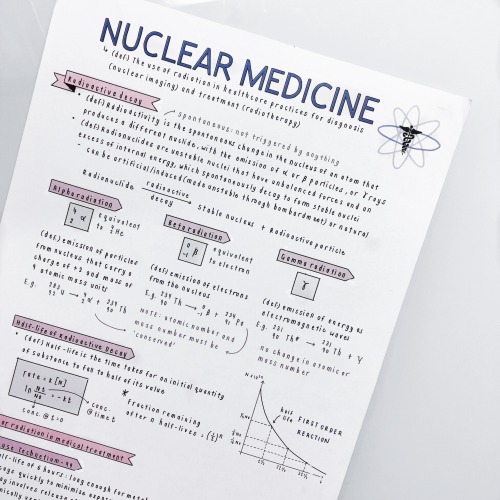Writing A Commentary Or Essay On A Text You’ve Never Read Before In Exam Conditions Can Be Daunting,

Writing a commentary or essay on a text you’ve never read before in exam conditions can be daunting, but with the proper approach to it, you can ace your way through it with little to no stress!
Before the exam
Familiarise yourself with how we read and find meaning in any text.
What are the effects of different types of structure, narration, rhythm, action, diction, sound, setting, characterisation, figurative language, tone, atmosphere, imagery, subject, themes, ideas, etc.
Knowing the common devices authors use to create meaning allows you to identify them more easily in any given text.
Practice, practice, practice!
Find any past exam papers available, even if they are for a different type of certificate, and practice them under exam conditions.
Take excerpts out of a random book and practice, whether it be from a library, or your own personal collection.
The more you practice critically analysing a text, the easier it will become. If you don’t have the time to sit down and write out a complete essay, even planning how you would structure your essay and the ideas you would discuss is beneficial. This really cannot be over stressed, the more you write on unseen texts, the more comfortable you will be tackling another in a serious exam situation.
If the essay must be handwritten, this will also give you an opportunity to ensure your handwriting is legible and you are used to writing for prolonged periods of time.
Compare ideas in a group.
I always find working in groups for English to be highly effective. By discussing a text with a group of friends, someone will probably express an idea you had not considered before and you’ll be more open for alternate interpretations and more likely to recognise them in your own time
Critique your past essays.
Whether they were prepared or unprepared essays, identify areas where you need to work on to improve your essay writing.
Recognise your strengths as well and make an effort to try and include them in all your future essays!
During the exam
Read the text several times.
Before reading it, look for anything that immediately sticks out. For poetry, is there a distinctive shape? For prose, how is the text separated - one block of text, or several paragraphs?
Your first read should simply be for initial impressions. Is there anything that strikes you as important? What is the main idea of the text after only reading it once? What is its tone?
The second reading should be for content. What ideas are at the forefront? What is the author trying to communicate? Underline and note aspects in the text about this. Colour-coding your annotations can be helpful here!
In your third reading, you should start noting the style. What stylistic features are prominent? There will likely be a lot on imagery, syntax, diction, structure, etc. Focus on the most important ones and their impact. Is there more to it than meets the eye?
Deconstructs the question if you are given one so you fully understand what it is asking you to do.
Probably stating the obvious, but it is so important to understand what the question is asking you to write about. Understanding the question can mean the difference between a standard essay and an amazing one.
Don’t just identify a familiar word in the question and use it to write about whatever you want. Make sure what you’re going to write about addresses all parts to the question. If you’re asked to write about how and to what effect something has had an impact on the reader, don’t just write about how; you must write about to what effect as well! I usually underline the most important parts of the question so I don’t forget to write about them.
Define relevant key terms that are important to the question. How is a character made interesting? What is meant by unreliable? Try to subtly integrate these into your introduction.
Plan your essay.
An examiner will usually be able to tell the difference between a planned and unplanned essay. Planning gives your essay structure, coherence, and makes it easy to follow.
You can take a linear structure, addressing aspects of the text line by line. Alternatively, you can take a conceptual approach - discussing narration in one paragraph, imagery in another, etc. In my experience, the conceptual approach usually scores higher, however it is really up to the text you are analysing and what you are comfortable writing with!
If you aren’t given any prompts or a guiding question, make sure your argument is really clearly outlined in your introduction, or else you’ll leave the examiner guessing as to what you’re writing about.
Make sure to include important quotes and examples in your plan so you don’t leave them out when you write it.
If you are stuck as to what your line of argument should be, I usually like to address how various techniques are used effectively to communicate the theme. It’s a general and open ended question that will fit any kind of text, so long as you identify the techniques and devices!
Essay must-haves:
Include a macro sentence as the first sentence of your introduction. Draw the reader in with a statement that broadly covers the ideas you are going to cover.
Every paragraph must start with a topic sentence and end with a concluding sentence that links it back to the aim of your essay. This also ensures that you actually address what you set out to talk about.
Integrate quotes and examples smoothly into your arguments. Small phrases and individual words especially give your arguments concrete evidence, and allow you to work the detail of the text.
Proof-read your completed essay.
There is nothing worse than to come across a simple grammatical mistake that was overlooked in a really well organised and argued essay. Try to read your essay through twice before handing it up to try and identify these stupid mistakes we all make under pressure.
Sorry for such a long post! This turned out a lot longer and more in-depth than I thought it would be, but hopefully it will be helpful to those of you who have any unprepared texts to tackle. Let me know if anything is unclear or if you have any questions here :) xx
More Posts from Swirlspill-study and Others

I believe in free education, one that’s available to everyone; no matter their race, gender, age, wealth, etc… This masterpost was created for every knowledge hungry individual out there. I hope it will serve you well. Enjoy!
FREE ONLINE COURSES (here are listed websites that provide huge variety of courses)
Alison
Coursera
FutureLearn
open2study
Khan Academy
edX
P2P U
Academic Earth
iversity
Stanford Online
MIT Open Courseware
Open Yale Courses
BBC Learning
OpenLearn
Carnegie Mellon University OLI
University of Reddit
Saylor
IDEAS, INSPIRATION & NEWS (websites which deliver educational content meant to entertain you and stimulate your brain)
TED
FORA
Big Think
99u
BBC Future
Seriously Amazing
How Stuff Works
Discovery News
National Geographic
Science News
Popular Science
IFLScience
YouTube Edu
NewScientist
DIY & HOW-TO’S (Don’t know how to do that? Want to learn how to do it yourself? Here are some great websites.)
wikiHow
Wonder How To
instructables
eHow
Howcast
MAKE
Do it yourself
FREE TEXTBOOKS & E-BOOKS
OpenStax CNX
Open Textbooks
Bookboon
Textbook Revolution
E-books Directory
FullBooks
Books Should Be Free
Classic Reader
Read Print
Project Gutenberg
AudioBooks For Free
LibriVox
Poem Hunter
Bartleby
MIT Classics
Many Books
Open Textbooks BCcampus
Open Textbook Library
WikiBooks
SCIENTIFIC ARTICLES & JOURNALS
Directory of Open Access Journals
Scitable
PLOS
Wiley Open Access
Springer Open
Oxford Open
Elsevier Open Access
ArXiv
Open Access Library
LEARN:
1. LANGUAGES
Duolingo
BBC Languages
Learn A Language
101languages
Memrise
Livemocha
Foreign Services Institute
My Languages
Surface Languages
Lingualia
OmniGlot
OpenCulture’s Language links
2. COMPUTER SCIENCE & PROGRAMMING
Codecademy
Programmr
GA Dash
CodeHS
w3schools
Code Avengers
Codelearn
The Code Player
Code School
Code.org
Programming Motherf*?$%#
Bento
Bucky’s room
WiBit
Learn Code the Hard Way
Mozilla Developer Network
Microsoft Virtual Academy
3. YOGA & MEDITATION
Learning Yoga
Learn Meditation
Yome
Free Meditation
Online Meditation
Do Yoga With Me
Yoga Learning Center
4. PHOTOGRAPHY & FILMMAKING
Exposure Guide
The Bastards Book of Photography
Cambridge in Color
Best Photo Lessons
Photography Course
Production Now
nyvs
Learn About Film
Film School Online
5. DRAWING & PAINTING
Enliighten
Ctrl+Paint
ArtGraphica
Google Cultural Institute
Drawspace
DragoArt
WetCanvas
6. INSTRUMENTS & MUSIC THEORY
Music Theory
Teoria
Music Theory Videos
Furmanczyk Academy of Music
Dave Conservatoire
Petrucci Music Library
Justin Guitar
Guitar Lessons
Piano Lessons
Zebra Keys
Play Bass Now
7. OTHER UNCATEGORIZED SKILLS
Investopedia
The Chess Website
Chesscademy
Chess.com
Spreeder
ReadSpeeder
First Aid for Free
First Aid Web
NHS Choices
Wolfram Demonstrations Project
Please feel free to add more learning focused websites.
*There are a lot more learning websites out there, but I picked the ones that are, as far as I’m aware, completely free and in my opinion the best/ most useful.

as requested by quite a few people - a masterpost of educational podcasts. links go to either the site or the itunes podcast store. an excerpt of the description is included with each.
* indicates a podcast that i listen to regularly
entertainment
*welcome to night vale - twice-monthly updates for the small desert town of night vale
*muggle cast - everything harry potter
general information
radiolab - investigation told through sounds and stories, and centered around one big idea
*stuff you should know - about everything from genes to the galapagos
*stuff mom never told you - the business of being women
tedtalks
good job, brain - part pub quiz show, part offbeat news
news
no one knows anything - the politics podcast from buzzfeed news
wait wait…don’t tell me - weekly current events quiz
college
*college info geek - the strategies and tactics the best students use
*getting in - your college admissions companion
math
math for primates - a couple of monkeys who decided that arguing about mathematics was a better use of their time than throwing poo at one another
math mutation - fun, interesting, or just plain weird corners of mathematics
science
60 second health - latest health and medical news
the naked scientists - interviews with top scientists, hands-on science experiments
60 second science - the most interesting developments in the world of science
startalk - astronomy, physics, and everything else about life in the universe
nasa science cast - science behind discoveries on earth, the solar system, and beyond
history
*myths and legends - myths, legends, and folklore that have shaped cultures
stuff you missed in history class - the greatest and strangest stuff you missed
the podcast history of our world - from the big bang to the modern age! …eventually
witness - the story of our times told by the people who were there
the history chicks - two women. half the population. several thousands years of history.
entrepreneurship & finances
practical money matters - better managing their finances
the internet business mastery - learn how to create an internet based business
social triggers insider - the fields of psychology and human behavior
listen money matters - honest and uncensored, this is not your father’s boring finance show
writing & literature
professional book nerds - it’s our job to discuss books all day long
a way with words - words, language, and how we use them
grammar girl - short, friendly tips to improve your writing
classic poetry aloud - recordings of the greats poems of the past
language
esl (english) - improve english speaking and listening skills
language pod
coffee break
search in your podcast app for specific languages!
art
99% invisible - exploration of the process and power of design
tips and tricks photography
the arts roundtable
hobbies & other
stash & burn (knitting)
practical defense - staying safe in our increasingly dangerous urban environments
zen and the art of triathlon - a triathlete’s view on living the multisport life
the art of charm - make you a better networker, connecter, and thinker
the indoor kids - isn’t just about video games, isn’t not about video games
rationally speaking - explore the borderlands between reason and nonsense
the dice tower - board games, card games, and the people who design and play them
motivational & inspirational
back to work - productivity, communication, work, barriers, constraints, tools, and more
personal growth podcast - classic and contemporary self development audio
what it takes - conversations with towering figures in almost every field
here be monsters - exploring the dark corners of the human mind
on being - the big questions of meaning with scientists, theologians, artists, teachers
i'll be having pharmacology next sem, any tips?
HI! :)
Pharmacology is the heart of pharmacy. You need to have a good memorisation skill but understanding it will be the key. Sad to say, there is no shortcut. You need to take a lot of your time to study it by heart.
In studying the drugs:
Study the normal mechanism of the body
Study the abnormal mechanism of the body
Compare the normal & abnormal mechanism of the body
Study how the drug works to correct the abnormal mechanism of the body
for example you are studying cardiovascular drugs: 1. study the normal physiology of the heart 2. study what happen when a person has a cardiovascular disease 3. study the difference between a normal heart & a heart with cardiovascular disease 4. study how cardiovascular drugs will correct the condition
Use flashcards, notecards & the likes
Use one side of the card and write the drug & other side with is mechanism of action
Use one side of the card and indicate its pharmacologic category & the other side with the list of drugs under that category
This are very handy & you can bring it anywhere you go. :)
Be creative, Use Mnemonics
In this way, the information will be easy to remember.
For example,
the non-specific beta blockers are NSTP (Nadolol, Sotalol, Timolol, Propranolol)
specific beta blockers are BEAM (Bisoprolol, Esmolol, Atenolol, Metoprolol)
beta blockers, mostly but not all the time, ends with -olol
angiotensin II receptor antagonist usually ends with -sartan (Losartan, Candesartan)
HMG-CoA reductase inhibitors usually ends with -statin (Simvastatin, Atorvastatin, Rosuvastatin)
ACE inhibitors usually ends with -pril (Captopril, Lisinopril)
Proton pump inhibitor - ends with -prazole (Pantoprazole, Esomeprazole)
H2 receptor blockers -ends with -tidine (Famotidine, Cimetidine)
Be productive during internships. Use that as an opportunity to be more familiar with the drugs.
The arrangement of medicine either in the community or hospital setting is mostly by their therapeutic category. Observe. Read. Write. Repeat. In this way you will be familiar with the drugs more.
Guide books & Apps
there are a lot of guide books like Pharmacopeia, but due to technology it is easily accessible to everyone today. :) There are several apps that are downloadable for free in the Apps Store & Google Play like…
Epocrates
Micromedex Drug Information
Monthly Prescribing Reference
The course itself is not easy but if you have the determination to study & to learn, nothing will come difficult. Good luck to you! I know you can do it. :)
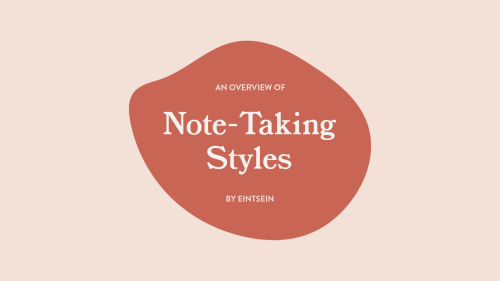

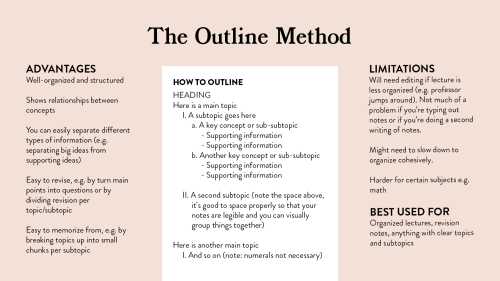
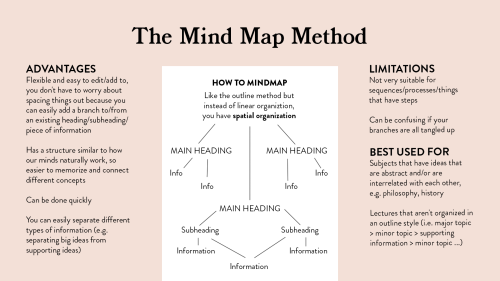

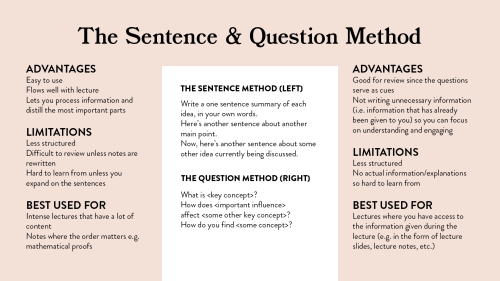


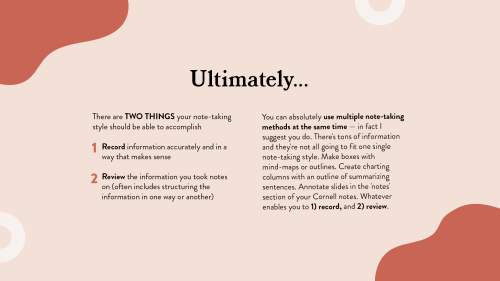
An Overview of Note-Taking Styles
Note-taking is one of the most essential skills a student should master. It allows you to record and review information to be used in the future. But what’s the best way to do so? Here’s an overview of note-taking styles that can help you maximize your learning!
How to Read From a Textbook
Hi guys! So I’ve noticed that a lot of people, including myself, struggle with reading directly from a textbook and actually retaining all of the information.
Well my friends I am here to change that [queue the victory music]. Recently I discovered a reading strategy known as the SQ3R technique. It stands for Survey, Question, Read, Recite, Review. I’ve found this technique to be extremely helpful when it comes to reading through textbooks, and so now I’m passing this information onto my dear followers.
1. Survey
The first step in this process is to get a basic idea of what you’re going to be reading. Most textbooks have chapter outlines or a brief summary at the beginning of each chapter. Take about five minutes to skim through these. By doing this, you’ll have the basic structure of what you’ll be learning in your head.
2. Question
This step will be repeated multiple times throughout your reading, so pay attention! Within each chapter, there are section titles that give you a vague idea of what the next few paragraphs will be about. This step asks that you turn the section title into a question. For example, we’ll say that our section title is “The Changing Role of the States.” You can turn this into questions such as “how did the role of the states change” and “which states changed and how.” When you turn the titles into questions, you end up looking for the answers while you’re reading rather than simply reading. This stops you from reading the same line over and over again.
3. Read
This one’s the obvious one. Read your textbook. Take notes while you’re reading. Write down all the important definitions, concepts, names, dates, etc. But remember to take breaks! Taking a three minute break for every twenty minutes of reading allows information to settle in your brain. It also helps with memory retention.
4. Recite
I’ll admit I’m still a bit uncomfortable with this step but it’s helped me a lot with remembering what I’ve read. Basically, this step asks you to summarize what you’ve just read out loud. I do this after each section, and then I summarize the whole chapter once I’ve finished the chapter. (Pro Tip: If you’re uncomfortable with talking to yourself, try talking to a recording device or summarize to a nearby friend.)
5. Review
Review, review, review. I cannot stress this enough. Read over your notes the day after, then the week after. Studies show that you remember 60% more of the material you learned when you review it the next day. Don’t forget you can review with more than just your notes! Make flashcards or foldables with the most important information in the chapter and quiz yourself! So many textbooks have quizzes online for each chapter, so use them!!!! I find mind maps to be super helpful in studying too. Reviewing is a super important step, so don’t think that you can forget about studying just because you’ve read through a chapter!
I might include that, as of recent, many professors have been saying that there is a fourth ‘R’ to this process: Relate. With this step you simply relate the information you’ve just read back to something important in your life. When you make connections with your reading, it becomes easier to remember the material.
Well that’s all I’ve got for you guys for now. I hope this helps at least a few of you. Keep on studying guys, and good luck on finals! ╚(•⌂•)╝

Hey so, I decided to do another masterpost. This time on exams. Some tips for studying at the very last minute if you are like me, disclaimer: I am not in any way supporting cramming but this is just to help you through if you are left with no choice other than cramming.
Cramming
Cramming tips that actually work by @optomstudies
The night before the exam
What to do the night before an exam by @beautifullearning
The night before your exam by @tiny-personal-university-thing
The night before exam and I didn’t study guide by @renaistudying
The night before test and I haven’t started studying by @getstudyblr
Revision methods
Revision methods that actually work by @alimastudies
The 5 Best Revision Methods by @bstudies
Study tips
More unconventional study tips by @minimaliststudy
A stash of tiny study tips by @justestjarchives
College study tips that actually help by @samsstudygram
Five tips for study marathons by @booksavolonte
General study tips by @plantednotes
More study tips
My study tips by @anatomyandcappuccini
My study tips
Personal study tips
Quickfire study tips by @annabaestudying
Quick study tip by @studyspiratiom-coffee
Rare study tips by @studybllog
Scientifically proven study tips by @swankiegrades
Secret study tips I wish someone would have told me by @fearlessroadtomd
Some rare study tips by @organisedorgana
Top 5 study tips by @studyign
Weird study tip by @artemissstudies
101 study tips by @study-early
Study tips by @howtohighschool
Study tips from someone who has already been there by @haylstudies
Study tips straight from my professor by @just-refuse-to-be-stopped
Study tips that helped me get back on my feet by @sillydaisies
Study tips that aren’t bullshit by @thebitchwhomadeit
Tips for effective study by @kimtented
How I write revision summaries by @athenastudying
Ways to study for exams that are actually productive
10 mistakes when studying by @howtostudyquick
Memorising information
How to memorise information by @monetstudy
How to memorise information faster by @qxzu
Memorization tips by @aescademic
Memorization tips by @determinationandcaffeine
Memorization tips by @studyquill
Exam tips
How to cope with exams by @uk-studying
How to revise for exams by @a-pro-s-studyblr
Studying for exams by @orangeblossomstudies
Tips for doing well on your exams by @aboysstudyblr
Tips for doing well on your exams by @thepeachystudies
Exam tips by @studywithmaggie
Exam guides
Finals: study guide for the brave by @educatier
Pennyfynotes guide to exam season by @pennyfynotes
Quick guide to doing the finals by @inkskinned
Test taking tips
How I revise for exams + tests
How to study for a test by @tbhstudying
My test taking tips by @55studies
Test taking tips
Exam preparation
How to make a stress free exam plan by @marias-studyblr
How to mentally prep yourself for a test by @eruditicn
Procrastination
How to beat procrastination by @eintsein
Types of procrastination and how to deal with them by @emmastudies
Time management
Time management by @academiceve
Time management tips for busy students
Motivation
My motivation tag
Other masterposts by me
Notetaking masterpost
College advice masterpost
Apps for students masterpost
Icon credits to @rhubarbstudies
what tips would you give to someone who wants to learn a new language, or continue learning a language over the summer break?? any apps or websites, or ways to stay motivated?
Learning a new language or continuing learning is honestly something I struggle with simply because of my experience with bad teachers, BUT I can still give you some tips on what I’ve done to stay motivated so far.
Find a language you are passionate about!! If you’re burnt out on what you’re learning, find a new language to learn. It’s not ideal to start back in square one, but it’s okay to do so!
Make flash cards! Everyone recommends this, but you can make a game out of what you’re learning. If you’re on the go, I recommend downloading Tinycards. Since it’s owned by Duolingo, they have sets premade for your target language.
Watch videos. This has helped a lot with learning a new language for me. You can either watch educational videos where you’re being taught grammar or vocab or you can watch videos of people speaking in your target language.
Interact with the language! Watch movies, listen to music, etc. Find different genres you might not enjoy in your native language and try them your target language! You never know what new content you come across that you enjoy.
Google Translate is not your enemy. It’s okay to use it. It’s not what people want to hear, but it’s ok to use if you’re struggling with how to pronounce a word or if there’s a word you simply just don’t know.
Pace yourself. Work on your target language at least 15 minutes a day especially for new learners. It sounds daunting, but practice makes for motivation.
Some apps/websites I recommend:
Duolingo
Tinycards
Memrise
YouTube (Use this to learn the alphabet and numbers. Duolingo seems to not understand “beginner” means you’re a beginner.)
Leo
Google Translate
Spotify/Pandora
Netflix/Hulu
These are all pretty standard tips that I’ve seen, but I fully stand by all of them. More tips can be found at my Langblr @ess-tset under the tag #learning. I hope this helps!
-
 nerdhelp reblogged this · 1 month ago
nerdhelp reblogged this · 1 month ago -
 studyblraesthetics reblogged this · 2 years ago
studyblraesthetics reblogged this · 2 years ago -
 wilhelm--fink liked this · 2 years ago
wilhelm--fink liked this · 2 years ago -
 uvindi reblogged this · 2 years ago
uvindi reblogged this · 2 years ago -
 uvindi liked this · 2 years ago
uvindi liked this · 2 years ago -
 studyblraesthetics liked this · 3 years ago
studyblraesthetics liked this · 3 years ago -
 briightskies reblogged this · 3 years ago
briightskies reblogged this · 3 years ago -
 briightskies liked this · 3 years ago
briightskies liked this · 3 years ago -
 byunsbee reblogged this · 3 years ago
byunsbee reblogged this · 3 years ago -
 burningcakedetective liked this · 3 years ago
burningcakedetective liked this · 3 years ago -
 swirlspill-study reblogged this · 3 years ago
swirlspill-study reblogged this · 3 years ago -
 agirlinthegalaxy reblogged this · 3 years ago
agirlinthegalaxy reblogged this · 3 years ago -
 the49thryu liked this · 3 years ago
the49thryu liked this · 3 years ago -
 otaref reblogged this · 4 years ago
otaref reblogged this · 4 years ago -
 twin526 liked this · 4 years ago
twin526 liked this · 4 years ago -
 randomcollection liked this · 4 years ago
randomcollection liked this · 4 years ago -
 studyblogmasterlists reblogged this · 4 years ago
studyblogmasterlists reblogged this · 4 years ago -
 burningcakedetective reblogged this · 4 years ago
burningcakedetective reblogged this · 4 years ago -
 photosynthistudies reblogged this · 4 years ago
photosynthistudies reblogged this · 4 years ago -
 zim-mami-wata liked this · 4 years ago
zim-mami-wata liked this · 4 years ago -
 ootwdeancas liked this · 4 years ago
ootwdeancas liked this · 4 years ago -
 aliceofheartss reblogged this · 4 years ago
aliceofheartss reblogged this · 4 years ago -
 aliceofheartss reblogged this · 4 years ago
aliceofheartss reblogged this · 4 years ago -
 studyingfluff reblogged this · 4 years ago
studyingfluff reblogged this · 4 years ago -
 studyingfluff reblogged this · 4 years ago
studyingfluff reblogged this · 4 years ago -
 quartzified reblogged this · 5 years ago
quartzified reblogged this · 5 years ago -
 rororororoboat liked this · 5 years ago
rororororoboat liked this · 5 years ago -
 the-ghost-of-mona-lisa liked this · 5 years ago
the-ghost-of-mona-lisa liked this · 5 years ago -
 corgic1ouds liked this · 5 years ago
corgic1ouds liked this · 5 years ago -
 fukikosviolin liked this · 5 years ago
fukikosviolin liked this · 5 years ago -
 soldmysoulforchicken liked this · 5 years ago
soldmysoulforchicken liked this · 5 years ago -
 selfcarehope liked this · 5 years ago
selfcarehope liked this · 5 years ago -
 onlytheyoung13 reblogged this · 5 years ago
onlytheyoung13 reblogged this · 5 years ago -
 onlytheyoung13 liked this · 5 years ago
onlytheyoung13 liked this · 5 years ago -
 out-of-pulse reblogged this · 5 years ago
out-of-pulse reblogged this · 5 years ago -
 penguingrocerybag liked this · 5 years ago
penguingrocerybag liked this · 5 years ago -
 imperfectvibez reblogged this · 5 years ago
imperfectvibez reblogged this · 5 years ago -
 unburyme reblogged this · 5 years ago
unburyme reblogged this · 5 years ago -
 unburyme liked this · 5 years ago
unburyme liked this · 5 years ago -
 user3837372772 liked this · 5 years ago
user3837372772 liked this · 5 years ago
a study blog for collected references, advice, and inspiration
267 posts







